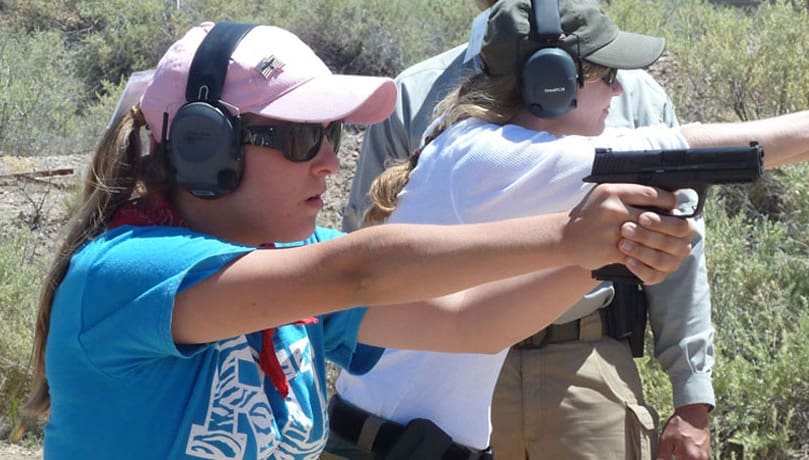Question: If you’re an individual who’s suing a federal regulatory agency and that agency then knocks on your door to conduct an audit of your business operations, is it reasonable to conclude that the two events are connected? Would it be fair to suspect the agency of trying to harass the plaintiff who’s been challenging their rulemaking…and winning?
That’s exactly what’s happened to Michael Cargill who owns Central Texas Gun Works in south Austin. Cargill was the plaintiff in the eponymous Cargill v. Garland bump stock case. Cargill won that Fifth Circuit battle resulting in bump stocks currently being legal in the states of Mississippi, Louisiana, and Texas.
Cargill is also suing ATF, again in the Fifth Circuit, over the regulatory agency’s “zero tolerance” policy toward federal firearms licensees. Shutting down more firearm retailers is a key front in the Biden administration’s War On Guns™. Old Joe has made much of targeting allegedly “rogue” gun dealers. That has resulted in a 500 percent increase in federal firearm license revocations.
To accomplish that, the ATF has unilaterally redefined what constitutes an intentional violation of the law. If a buyer misspells something on a 4473 form, for instance, and the FFL doesn’t catch it, the ATF is now classifying those simple, routine errors as willful violations and using them as a pretext to shut them down.
As Cargill’s lawsuit puts it . . .
…[E]verything changed in the summer of 2021, when the Biden Administration announced a new policy to enforce the [1968 Gun Control] Act against licensees who inadvertently fail to comply. As part of this effort, the Acting Assistant Director of the ATF George Lauder issued a memorandum instructing ATF Special Agents in Charge and Directors of Industry Operations to revoke FFLs for a single violation in many circumstances. Since then, revocations have increased over 500%, as the ATF has effectively written the word “willful” out of the statute by instituting a policy of revoking FFLs for inadvertent paperwork errors.
This new definition of “willful” violates the plain language of the governing statute and puts all law-abiding licensees at risk of revocation for minor and inconsequential paperwork errors that do not pose a threat to public safety, nor result in prohibited possessors obtaining firearms. Plaintiffs, who operate a gun store in Texas, seek a declaration that the ATF’s new enforcement policy violates the Act and a permanent injunction preventing Defendants from ignoring the Act’s requirement that violations be willful.
Given the fact that he has pending litigation against the firearms regulatory agency working its way through the federal courts, you can imagine Cargill’s surprise when four ATF agents showed up at his door the last week of June to conduct a “standard firearms compliance inspection.”
They did so without bothering to notify his attorney or the court.
Day 4 with ATF agents conducting a full audit/inspection at @centexguns Central Texas Gun Works. The worse thing they found so far was 2 customers spelled AUSTIN wrong on the 4473 out of 13,000 transactions. #2A #Texas #GarlandVCargill #AffirmativeAction pic.twitter.com/PuKyXaEIPG
— Michael Cargill (@michaeldcargill) June 30, 2023
I stopped by Central Texas Gun Works last week to talk to Cargill. He confirmed that CTGW was “due” for another inspection given that it had been almost five years since he last had the pleasure of hosting the ATF’s finest. He also told me the number of inspectors doing the audit wasn’t unusual given the large number of transfers he does in his business.
But auditing someone who’s suing you — showing up without any type of prior notification to their legal counsel — isn’t just bad form, it smacks of retaliatory intimidation. Cargill’s representatives at the Texas Public Policy Foundation, who filed the suit, got in touch with a counsel at the ATF who claimed, ‘Gosh, we didn’t know CTGW was on the audit list.’
Shazam!
Basic legal practice dictates no direct contact between parties to pending legal action without at least contacting the other party’s attorneys. It’s not a law, but it’s standard procedure. You’d think that might be doubly important when the target of the lawsuit regulates the plaintiff who’s suing the agency.
That didn’t happen here.
It’s easy enough to believe that a federal regulatory agency like ATF is big, lumbering, and bureaucratic enough for its industry operations inspectors to not be aware of a pending lawsuit by one of the businesses they regulate. It’s also easy enough to believe, given other actions by Biden administration agencies, that this was a ham-handed (“chickenshit” was how one attorney I talked to described it) attempt at harassment by a thuggish regulatory agency with little regard for the law or the Constitution.
You make the call.
Cargill’s attorneys notified the court that the defendant in the pending lawsuit is currently inspecting the plaintiff. The ATF filed this notice in response, acknowledging that yes, they are inspecting the business of the man who’s suing them and they pinkie swear they’ll notify his attorneys of any further actions against him.
…Defendants have expressed to Plaintiff, and Defendants confirm to the Court, that ATF will ensure Plaintiff’s counsel is notified of all further communications regarding the inspection. At the time the inspection was commenced, the inspecting IOIs were not aware that Plaintiff was involved in this pending litigation or represented by counsel. That issue has been remedied, and counsel will be notified of all further communications.
In other words: Oopsie! Our bad!
As of last week, when I talked to Cargill, he told me that in addition to examining his A&D book and inventory, he estimated the ATF folks had inspected about 13,000 transfer transactions and 4473 forms and found seven errors. One buyer had misspelled the word ‘Austin.’ One had entered his Social Security number in the wrong box on the form. One had written ‘TX’ instead of Texas.
These are the kinds of routine typos and mistakes that are inevitable in any business where humans are involved. Seven out of 13,000 is a 99.95% accuracy rate (a standard the ATF itself couldn’t possibly meet). No reasonable person could conclude that is indicative of “willful” violation of the law.
But under the instructions issued by ATF brass in 2021, that’s exactly the standard law-abiding FFLs are being held to. And that’s why Cargill has sued to stop it.
The inspectors finished their work at Central Texas Gun Works last week. Cargill hasn’t gotten their official findings or conclusions yet. Will ATF see seven typos as evidence of willful disregard for the law and try to pull his license…the license of someone who’s currently suing the agency over exactly that kind of willful, politically-motivated misreading of the law?
We’ll see. Stay tuned.








